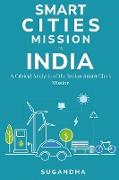A Critical Analysis of the Indian Smart Cities Mission
BücherAngebote / Angebote:
Smart cities are seen as the new way of securing sustainable urban development to address pressing issues of global urbanization. Sustainability is still often conceived through an environmental lens, yet any change in the built environment has implications for the social dimension of sustainability. Social sustainability is a dynamic concept that combines design of the physical realm with the design of the social world and promotes infrastructure to support social needs and concerns. While smart cities primarily aim at enhancing performance through an innovative use of digital data and technology, a social sustainability perspective stresses the critical interconnections between people and place. Through a critical literature review, this thesis establishes a dialogue between the smart city and social sustainability. It evaluates the smart city concept from a social sustainability perspective within a built environment paradigm. A multi-stage conceptual framework is advanced to study both the social objectives and outcomes of smart city policies. The conceptual framework aims to extract the major contextual social sustainability thematic factors and to evaluate the nature and nuances of social dimensions in smart cities. This is applied to the case of Smart Cities Mission (SCM) in India. A multi-scalar analysis evaluates the social environment of the smart cities at three levels - an overall examination of the Mission guidelines, analysis of 100 smart cities' aspirations, and an empirical focus on the two smart cities - Bhubaneswar and Faridabad. The analysis shows that the deliberation on global smart cities still lacks focus on social equity and inclusion. SCM acknowledges the significance of social sustainability to achieve balanced urban growth with references to social capital, inclusion and equity, infrastructure, and collaboration. However, the study indicates that they are not comprehensively delivered. This thesis systematically identifies an array of challenges and opportunities of the 100 SCM in India to develop smart 'social' cities. The broader message of the research is that social sustainability is an integral component of the urban agenda and appropriate steps must be taken to align social needs with urban development under the increasingly common but elusive smart city banner.
Folgt in ca. 15 Arbeitstagen




